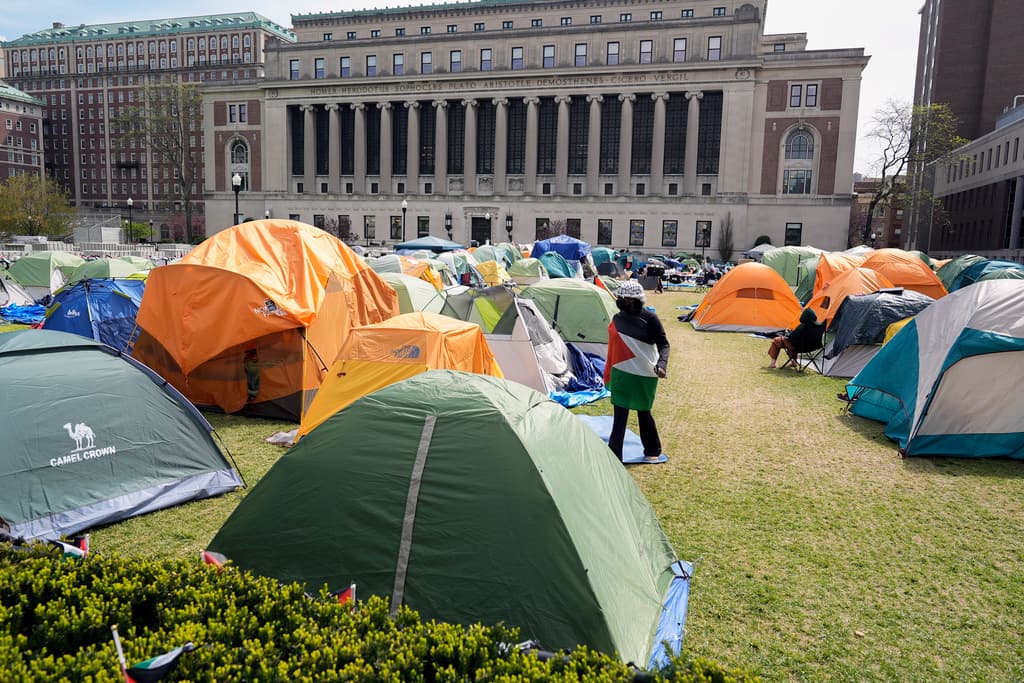Columbia University Releases Statement Supporting Campus Jewish Center After It’s Targeted in Protest — But the ‘Pathetic’ Sentiment Falls Flat
Anti-Israel student protesters staged a demonstration outside of the Kraft Center, which houses Columbia and Barnard’s chapter of Hillel, to call for the school to ‘sever all ties with Hillel.’

Columbia University, in a rare move, issued a statement supporting the school’s Kraft Center for Jewish Student Life after it was directly targeted by an anti-Israel student protest — but the school’s Jewish community is calling it too little, too late.
“Columbia has quietly released a statement following the protest outside Hillel today, mentioning mysterious, passive ‘efforts to intimidate’ without condemning the students engaging in threatening behavior,” a coalition of Jewish and Israel students at Columbia wrote in a post on X. “We appreciate NYPD and Public Safety for keeping us safe, but @Columbia’s leadership has to do better and directly condemn these actions.”
On Thursday night, anti-Israel student protesters staged a demonstration outside of the Kraft Center, which houses Columbia and Barnard’s chapter of Hillel, to call for the school to “sever all ties with Hillel.” The anti-Israel group behind the protest, Columbia University Apartheid Divest, accused Hillel — the nation’s largest Jewish campus organization — of being “genocidal propagandists” who manufacture “propaganda and consent for the Zionist entity’s imperialist and colonial projects.”
The anti-Israel protesters sought to disrupt an event featuring a CNN analyst, Barak Ravid, who is also an Israel journalist, that was held at the Kraft Center on Thursday. According to fliers disseminated by Columbia University Apartheid Divest ahead of the event, they instructed fellow students to “wear a mask and keffiyeh, come with friends and noisemakers, and bring the pressure.”
Videos of the demonstration capture the student agitators chanting slogans like “resistance is justified”, “Over 100,000 people dead, Hillel your hands are red”, and “Hillel you can’t hide, you invest in genocide.” Another video shows the protesters pledging to continue their efforts, calling out, “Make sure Hillel knows … we will be back.”
Inside of the building, several anti-Israel protesters staged a walkout of the event, chanting and holding signs as they loudly exited the room. Mr. Ravid, who was brought in to speak about the Israel-Hamas war, later wrote that it was a “shame” that students chose to “walk out outside in the rain and chant false and stupid accusations against me” instead of “asking questions and having a dialogue.”
Student body president of Columbia, Maya Platek, who is also Israeli, condemned the protest as an effort to “shut down the only safe space Jewish students have had at Columbia this last year.” She also called for a collective reckoning that “targeting Jewish spaces is not a form of legitimate protest & call it out for the antisemitism it is.”
Another Jewish student at Columbia, Eden Yadegar, identified the incident as a consequence of the administration’s repeated failures to stand up for its Jewish students. “This is what happens when you refuse to address pervasive antisemitism, @Columbia” she wrote in a post on X, sharing a video of the “mob” gathering outside of the Kraft Center.
By Friday morning, Columbia’s communications office issued a rare statement addressing the protest, writing that “Any efforts to intimidate the Kraft Center, Hillel and our Jewish community and all forms of antisemitism are unacceptable and inimical to what we stand for as a University.”
The statement, however, wasn’t received well by the school’s Jewish community, which viewed it as feeble and wishy-washy. Columbia’s Jewish Alumni Association lambasted the school’s response as “Pathetic, weak and totally insufficient.”
Others pointed out that, during the same night, Columbia issued a school-wide email announcing that the school’s “anti-discrimination and discriminatory harassment policy and procedures for students” training — which includes information on Title VI — was not mandatory but was “strongly” recommended. The news prompted an Israeli-American professor at Columbia, Shai Davidai, who has been an outspoken critic of the school’s handling of antisemitism, to declare that “I am ashamed of my own university.”
Underscoring the incident is the charge, made by the House Committee on Education and the Workforce, that Columbia’s administration has “imposed imposed shockingly
few meaningful disciplinary consequences” on those who perpetuated antisemitic harassment and disruption, despite being the “site of some of the most disturbing and extreme antisemitic conduct violations in the country.”
The committee’s 325-page report follows a year-long investigation into several elite universities including Columbia, Yale, and Harvard, and offers a harrowing account of administrative neglect in the face of rising harassment, intimidation, and assault over the past year.

